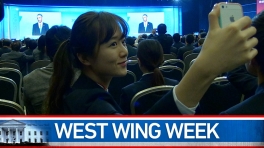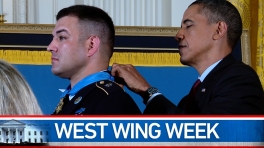Democracy & Human Rights
Speech in Cairo | Expanding Opportunity | Science & Technology | Democracy & Human Rights | Interfaith Engagement | Timeline
The President said that no system of government can or should be imposed upon one nation by any other, but that America is committed to advancing governments that reflect the will of the people. He committed the U.S. to support human rights everywhere: the ability of people to speak their mind and to have a say in how they are governed; confidence in the rule of law and the equal administration of justice; government that is transparent and doesn’t steal from the people; and the freedom to live as people choose. Governments that protect these rights, the President said, are ultimately more stable, successful and secure.
The U.S. works to advance democracy and human rights by living these values at home, standing up for human rights in public and in multilateral institutions, speaking frankly and consistently about these issues with governments and civil society, and supporting democracy advocates and civic groups working bravely to expand freedom in difficult environments.
Bolstering Democracy Assistance: The U.S. increased funding for democracy support by USAID and the Middle East Partnership Initiative (MEPI) across the Middle East and North Africa, in addition to the major investments in governance made in Iraq, Afghanistan and Pakistan. Funding for MEPI increased by 30 percent in FY2010, and an additional 32 percent increase is requested for FY2011.
Strengthening Civil Society: The U.S. supports local civil society groups working for political, economic, and social empowerment in their home countries through a variety of programs, and local grants now represent more than half of MEPI’s projects across the Middle East and North Africa. A few examples of programs to strengthen civil society, freedom of expression, and independent media include:
- In the West Bank, MEPI supported a year-long anti-corruption project by creating a Model Youth Parliament to analyze public projects, monitor legislation, and advocate against corruption.
- The Network of Democratic Journalists in the Arab World (NDJAW), supported by MEPI, links writers across the region to exchange information and support freedom of expression.
- In December 2009, the Citizen Radio Journalist Program launched a new youth program on Ammannet/Radio Al Balad in Jordan that discusses youth news and views and is broadcast four times a week, enabling Jordanian youth to develop and broadcast content on social, economic, political, and cultural issues from their own perspectives.
- For the second year in a row, the U.S. Embassy in Indonesia supported the Pesta Blogger conference which is Indonesia’s only national-level bloggers’ gathering, and sponsored a series of blogging workshops in 10 cities across Indonesia in the three months leading up to Pesta Blogger 2009.
Equality Under the Law: Through judicial training and exchange programs, human-rights training for police officers, technical assistance to governments, and including labor rights and other standards in our trade agreements, the U.S. works to promote and enshrine the rule of law abroad.


